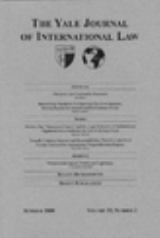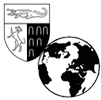
Yale Journal of International Law
Encyclopedia
The Yale Journal of International Law is a student-edited international
law review
at the Yale Law School
(New Haven, Connecticut
). The journal
publishes articles, essays, notes, and commentary that cover a wide range of topics in international and comparative law
.
Eisuke Suzuki, a graduate fellow from Tokyo
, the first issue was produced without assistance from the Law School. After being re-named as the Yale Journal of World Public Order, the journal obtained its current title. About ten years after its founding, the Yale Law School started to support the journal.
 Some of the journal's most-cited articles include:
Some of the journal's most-cited articles include:
's rankings, which are based on the number of citations per journal.
faculty, practicing international lawyers, distinguished alumni, and other campus visitors. In addition, the journal organizes a "works in progress" series at which Yale J.D.
and graduate law students present papers to their colleagues with a faculty respondent who provides feedback and constructive criticism. Some recent events are:
International law
Public international law concerns the structure and conduct of sovereign states; analogous entities, such as the Holy See; and intergovernmental organizations. To a lesser degree, international law also may affect multinational corporations and individuals, an impact increasingly evolving beyond...
law review
Law review
A law review is a scholarly journal focusing on legal issues, normally published by an organization of students at a law school or through a bar association...
at the Yale Law School
Yale Law School
Yale Law School, or YLS, is the law school of Yale University in New Haven, Connecticut, United States. Established in 1824, it offers the J.D., LL.M., J.S.D. and M.S.L. degrees in law. It also hosts visiting scholars, visiting researchers and a number of legal research centers...
(New Haven, Connecticut
New Haven, Connecticut
New Haven is the second-largest city in Connecticut and the sixth-largest in New England. According to the 2010 Census, New Haven's population increased by 5.0% between 2000 and 2010, a rate higher than that of the State of Connecticut, and higher than that of the state's five largest cities, and...
). The journal
Academic journal
An academic journal is a peer-reviewed periodical in which scholarship relating to a particular academic discipline is published. Academic journals serve as forums for the introduction and presentation for scrutiny of new research, and the critique of existing research...
publishes articles, essays, notes, and commentary that cover a wide range of topics in international and comparative law
Comparative law
Comparative law is the study of differences and similarities between the law of different countries. More specifically, it involves study of the different legal systems in existence in the world, including the common law, the civil law, socialist law, Islamic law, Hindu law, and Chinese law...
.
History
The Yale Journal of International Law is the oldest of Yale Law School's eight secondary journals still in publication. The journal was founded in 1974 by a group of students who were followers of the New Haven School of international law, and their publication was originally known as Yale Studies in World Public Order. Under the leadership of then editor in chiefEditor in chief
An editor-in-chief is a publication's primary editor, having final responsibility for the operations and policies. Additionally, the editor-in-chief is held accountable for delegating tasks to staff members as well as keeping up with the time it takes them to complete their task...
Eisuke Suzuki, a graduate fellow from Tokyo
Tokyo
, ; officially , is one of the 47 prefectures of Japan. Tokyo is the capital of Japan, the center of the Greater Tokyo Area, and the largest metropolitan area of Japan. It is the seat of the Japanese government and the Imperial Palace, and the home of the Japanese Imperial Family...
, the first issue was produced without assistance from the Law School. After being re-named as the Yale Journal of World Public Order, the journal obtained its current title. About ten years after its founding, the Yale Law School started to support the journal.
Content

- Kenneth W. Abbott, Modern International RelationsInternational relationsInternational relations is the study of relationships between countries, including the roles of states, inter-governmental organizations , international nongovernmental organizations , non-governmental organizations and multinational corporations...
Theory: A Prospectus for International Lawyers, Yale J. Int. Law 14:335 (1989) - Lea Brilmayer, SecessionSecessionSecession is the act of withdrawing from an organization, union, or especially a political entity. Threats of secession also can be a strategy for achieving more limited goals.-Secession theory:...
and Self-Determination: A Territorial Interpretation, Yale J. Int. Law 16:177 (1991) - Raidza Torres, The Rights of Indigenous PopulationsIndigenous rightsIndigenous rights are those rights that exist in recognition of the specific condition of the indigenous peoples. This includes not only the most basic human rights of physical survival and integrity, but also the preservation of their land, language, religion and other elements of cultural...
: The Emerging International NormNorm (sociology)Social norms are the accepted behaviors within a society or group. This sociological and social psychological term has been defined as "the rules that a group uses for appropriate and inappropriate values, beliefs, attitudes and behaviors. These rules may be explicit or implicit...
, Yale J. Int. Law 16:127 (1991) - Michael J. Glennon, Two Views of Presidential Foreign Affairs Power: Little v. BarremeLittle v. BarremeLittle v. Barreme, 6 U.S. 170 was an 1804 decision of the United States Supreme Court which found that the President of the United States does not have "inherent authority" or "inherent powers" which allow him to ignore a law passed by the United States Congress.-Summary:Pro DN, Pres order...
or Curtiss-WrightUnited States v. Curtiss-Wright Export Corp.United States v. Curtiss-Wright Export Corp., 299 U.S. 304 , was a United States Supreme Court case involving principles of both governmental regulation of business and the supremacy of the executive branch of the federal government to conduct foreign affairs.-The Facts:In Curtiss-Wright, the...
?, Yale J. Int. Law 13:5 (1988) - Daniel Bodansky, The United Nations Framework Convention on Climate ChangeUnited Nations Framework Convention on Climate ChangeThe United Nations Framework Convention on Climate Change is an international environmental treaty produced at the United Nations Conference on Environment and Development , informally known as the Earth Summit, held in Rio de Janeiro from June 3 to 14, 1992...
: A Commentary, Yale J. Int. Law 18:451 (1993)
Rankings
The journal was ranked second among international law reviews in the 2007 ExpressO Guide to Top Law Reviews based on the number of manuscripts received. It was also ranked third out of Yale's secondary law journals in Washington and Lee University School of LawWashington and Lee University School of Law
The Washington and Lee University School of Law is a private American Bar Association-accredited law school located in Lexington in the Shenandoah Valley region of Virginia. Facilities are currently on the campus of Washington and Lee University in Sydney Lewis Hall...
's rankings, which are based on the number of citations per journal.
Events
In collaboration with Opinio Juris, occasional online symposia centering on scholarly conversations on articles published in the journal are organized. In collaboration with the Forum on the Practice of International Law, the journal periodically convenes panels, workshops, and talks on diverse topics with guests including YaleYale University
Yale University is a private, Ivy League university located in New Haven, Connecticut, United States. Founded in 1701 in the Colony of Connecticut, the university is the third-oldest institution of higher education in the United States...
faculty, practicing international lawyers, distinguished alumni, and other campus visitors. In addition, the journal organizes a "works in progress" series at which Yale J.D.
Juris Doctor
Juris Doctor is a professional doctorate and first professional graduate degree in law.The degree was first awarded by Harvard University in the United States in the late 19th century and was created as a modern version of the old European doctor of law degree Juris Doctor (see etymology and...
and graduate law students present papers to their colleagues with a faculty respondent who provides feedback and constructive criticism. Some recent events are:
- The "New" New Haven School (2007)
- Nation BuildingNation-buildingFor nation-building in the sense of enhancing the capacity of state institutions, building state-society relations, and also external interventions see State-building....
in the Middle EastMiddle EastThe Middle East is a region that encompasses Western Asia and Northern Africa. It is often used as a synonym for Near East, in opposition to Far East...
(2005) - Reflections on the International Court of JusticeInternational Court of JusticeThe International Court of Justice is the primary judicial organ of the United Nations. It is based in the Peace Palace in The Hague, Netherlands...
's Oil Platforms Decision (2004) - Current Pressures on International Humanitarian LawInternational humanitarian lawInternational humanitarian law , often referred to as the laws of war, the laws and customs of war or the law of armed conflict, is the legal corpus that comprises "the Geneva Conventions and the Hague Conventions, as well as subsequent treaties, case law, and customary international law." It...
(2003) - Reflections on the International Court of Justice’s LaGrandLaGrand caseThe LaGrand case was a legal action heard before the International Court of Justice which concerned the Vienna Convention on Consular Relations...
Decision (2002) - Realistic IdealismIdealismIn philosophy, idealism is the family of views which assert that reality, or reality as we can know it, is fundamentally mental, mentally constructed, or otherwise immaterial. Epistemologically, idealism manifests as a skepticism about the possibility of knowing any mind-independent thing...
in International Law, a conference in honor of W. Michael Reisman. Selected proceedings from this conference were published in the Summer 2009 issue.

